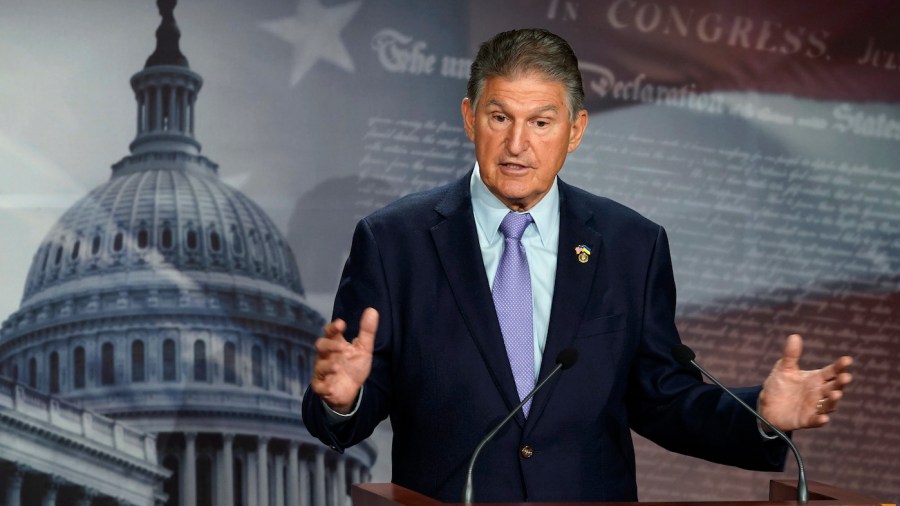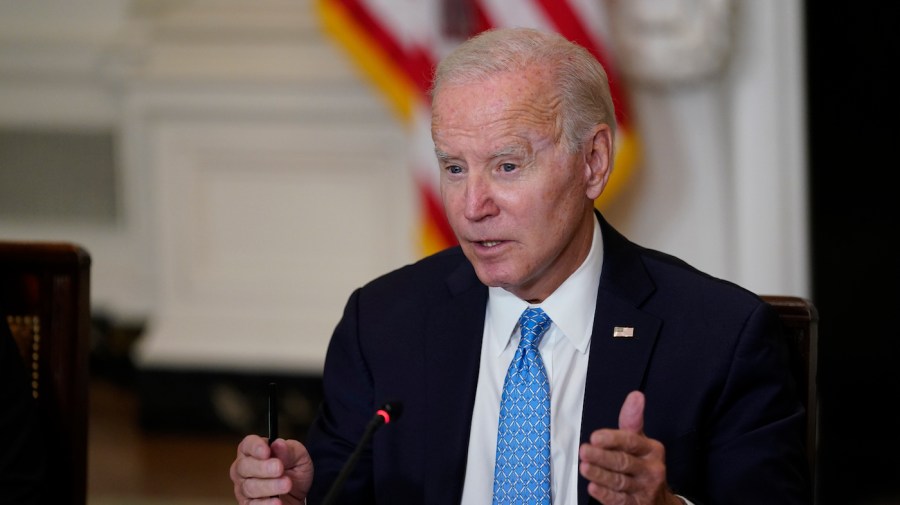Five things to know about Congress’s spending showdown

Congress is gearing up for a long week ahead as lawmakers work to finalize a deal on funding federal agencies in time to avert a government shutdown.
Lawmakers have until just before midnight on Friday to pass a short-term funding bill, often referred to as a continuing resolution (CR), that would keep the government fully functioning.
Congress is expected to strike a deal in time to keep the government funded for fiscal 2023, which begins Oct. 1, but with the shortened holiday week and several outstanding disagreements that have members threatening “no” votes, more eyes are on Capitol Hill as tensions could come to a head.
Here are five things to know about this week’s congressional spending showdown.
Manchin’s side deal

Sen. Joe Manchin (D-W.Va.) speaks during a news conference at the Capitol in Washington.
Anticipation is building over how an agreement will shake out this week between Sen. Joe Manchin (D-W.Va.) and Democratic leadership that would use the CR to advance his energy permitting proposal.
Manchin struck the deal with Senate Majority Leader Charles Schumer (D-N.Y.) and other top Democrats as part of a larger agreement to gain his support for the Inflation Reduction Act, a sprawling tax, climate and health care plan passed along party lines last month.
But growing opposition on both sides of the aisle threatens the permitting proposal’s chances of actual passage.
More than a handful of Senate Democrats have already come out against the plan linking the two, as advocates say Manchin’s proposal would undercut environmental reviews. And dozens of House lawmakers are also pushing for the same.
Manchin has been hopeful that he can win over enough GOP support to make up for any loss of Democratic backing in the Senate, noting Republicans have long been pushing for permitting reform. But many Senate GOP lawmakers have been reluctant to back the effort amid party frustration with Democrats for passing their signature spending plan without buy-in from the other side of the aisle.
“I think my side learned a good lesson in dealing with Sen. Manchin. You never let a dog guard your food. He’ll eat it. That’s the way this place works,” Sen. John Kennedy (R-La.) told reporters last week, adding there’s “no question” there are “some people mad at Joe.”
Shutdown squeeze
Congress will risk its first major shutdown in years if lawmakers are unable to meet the midnight deadline — but lawmakers are expected to reach an agreement on a short-term funding bill before then, with the process of beginning to pass a CR starting on Tuesday.
Schumer also told reporters last week that the Senate is still pressing forward with a plan to vote on Manchin’s proposal. The Senate is poised to vote on legislation sent from the House on Tuesday afternoon that will be used to link Manchin’s permitting reform proposal and the CR.
However, some sources expect the effort to fail amid a vote whipping campaign by GOP leadership urging Republicans to oppose Manchin’s push. In that scenario, the Senate will likely set up a later vote on another CR that doesn’t include Manchin’s bill to avoid a shutdown.
But in the less likely event that lawmakers miss their funding deadline this week, Zach Moller, a former Senate Democratic budget aide, anticipates Congress will have a small cushion for some of the more damaging effects of a lapse in funds due to the timeline.
“The vast majority, if not all, of federal employees, who may be subject to being furloughed, wouldn’t be working on Saturday and Sunday anyway,” Moller said, though he added that had the potential to change quickly.
“If we got to Monday and we still didn’t have a CR, then then we’re talking much more like a normal shutdown,” he added.
Ukraine dollars

President Joe Biden speaks during a meeting of the White House Competition Council in the State Dining Room of the White House in Washington.
The Biden administration wants Congress to approve more than $13 billion in funding to continue responding to Russia’s ongoing invasion of Ukraine.
Though some members have raised concerns about the request, there is support on both sides of the aisle. Congress is expected to approve a bulk of the funding, though it’s unclear which forms of aid will be prioritized.
Members say Ukraine’s reclaiming occupied territory from Russia recently also helps the case for more funding.
“Success brings success,” Sen. Richard Shelby (Ala.), the top Republican on the Senate Appropriations Committee, said earlier this month, adding the Ukrainians are showing “a lot of fight and a lot of success on the ground, and that gets everybody’s attention.”
More than $50 billion in Ukraine-related funds have been approved by Congress since the invasion began in February.
Additional public health funding

Physician Assistant Susan Eng-Na prepares a syringe with the monkeypox vaccine before inoculating a patient during a vaccination clinic at the OASIS Wellness Center in New York.
Senate Democrats have been pushing for Congress to provide supplemental funding for the nation’s COVID-19 and monkeypox response efforts, after the White House asked for more than $26 million in funding last month.
However, Senate Republicans have balked at the funding request while pressing for more figures around accounting for previous coronavirus funds. Republicans have also been quick to seize on Biden’s recent comments declaring the pandemic “over” to undercut the ask.
Some Republicans have also indicated securing monkeypox funding would be a heavy lift in their party, as top GOP leaders have pressed for as clean a CR as possible.
“There’s ample revenue that’s been provided to the administration to be able to deal with medical emergencies in this nation,” Sen. Mitt Romney (R-Utah) said.
Back to December
Congressional negotiators are expecting lawmakers to pass a bill extending funding at current levels to December, well after the midterm elections, though details around timing are still being hashed out.
The extension will allow negotiators more time to work out a larger deal on spending for fiscal 2023, as disagreements in defense funding and policy riders in areas such as abortion remain unresolved, teeing up another likely showdown at the end of the year.
Republicans in both chambers have been pushing for the CR to last as long as possible as the party works to take back control of Congress next year, when the GOP would be able to shape the next fiscal year’s budget.
But a number of GOP negotiators are pushing for Congress to finish its appropriations work by the end of the year, saying Republicans would already have more leverage in crafting fiscal 2023 spending in talks if at least one chamber tilted to the right after the November races.
“I’d prefer to extend it into December, and then you’ve always got the ability to do the other if you can’t reach agreement,” Sen. John Boozman (R-Ark.), who serves on the Senate Appropriations Committee, told The Hill last week.
“There’ll be some agencies that will want to plus up, others that will stay the same,” he added. “But the sooner we can do it, the better.”
Copyright 2023 Nexstar Media Inc. All rights reserved. This material may not be published, broadcast, rewritten, or redistributed. Regular the hill posts







